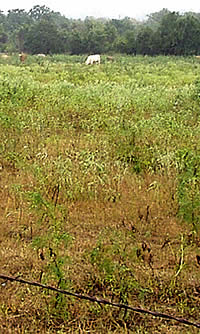Estate Tax Relief for Some Family Farmers: The Williamson Family Farm Story (cont.)
 In Williamson v. Commission 974 F.2d 1525 (9th Cir. 1992), the 9th Circuit Court of Appeals held that the special use valuation provision did not apply to the Williamson family farm (described previously). The Court held that the special use valuation provision only applies if the heir to farmland is farming the farmland (or is engaged in another qualified use of the farmland). The special use valuation provision does not apply if the heir rents the farmland to someone else with a cash lease—even if that someone else is another family member. In the case of the Williamson family farm, the heir and the decedent's son, Beryl Williamson, was not farming the farmland. Instead, Beryl was renting the farmland to the decedent's grandson, Harvey Williamson.
In Williamson v. Commission 974 F.2d 1525 (9th Cir. 1992), the 9th Circuit Court of Appeals held that the special use valuation provision did not apply to the Williamson family farm (described previously). The Court held that the special use valuation provision only applies if the heir to farmland is farming the farmland (or is engaged in another qualified use of the farmland). The special use valuation provision does not apply if the heir rents the farmland to someone else with a cash lease—even if that someone else is another family member. In the case of the Williamson family farm, the heir and the decedent's son, Beryl Williamson, was not farming the farmland. Instead, Beryl was renting the farmland to the decedent's grandson, Harvey Williamson.Beryl argued that Congress had not considered the possibility that an heir to a family farm would rent the farm to another family member and that imposing lower estate taxes on the Williamson family farm was consistent with Congress’s purpose in enacting the special use valuation provision. The court rejected Beryl’s argument. The 9th Circuit emphasized that Congress had spoken, and the Court was required to enforce the statutory language as written. “Congress has drawn a line, permitting cash leases by some family members and not by others. To the extent Williamson argues that this line seems arbitrary and could just as easily have been drawn to encompass his situation, he is preaching to the converted. That we might disagree with a legislative distinction Congress has made…does not empower us to rewrite the statute…” The Court found that the statutory language suggested “deliberate congressional line-drawing, rather than mere legislative oversight.”
Beryl had originally paid the lower estate tax rate (based on the farmland’s special use value). After the 9th Circuit Court’s decision, Beryl was faced with having to pay an additional $42,026 in estate taxes (based on the farmland’s fair market value). Beryl had to make a choice between paying this $42,026 out of his own pocket or selling the family farm.
The 9th Circuit’s interpretation of the special use valuation provision was not entirely unreasonable. The purpose of the special use valuation provision is to protect family farmers, and Beryl, who was employed off of the family farm, was not a family farmer. Furthermore, by entering into a cash lease with Harvey, Beryl had not assumed any of the financial risks of farming. The 9th Circuit reasoned that Harvey, the person who had assumed the financial risks of farming, would not benefit if Beryl were permitted to pay lower taxes. This is not entirely true; Harvey would benefit indirectly because it would be more likely that Harvey would have the opportunity to farm—less likely that Beryl would sell the family farm—if Beryl were not charged an additional $42,026 in estate taxes. On the other hand, the 9th Circuit correctly noted that Beryl could avoid paying the higher estate tax rate by assuming some of the financial risks of the family farm. Beryl could take advantage of the special use valuation provision if he shared the financial risks of the family farm with Harvey by entering into a crop-share lease, rather than a cash lease, with Harvey.
While the 9th Circuit’s interpretation of the special use valuation provision did not generate absurd results, it was unclear whether the result in Williamson reflected congressional intent. It was unclear whether the special use valuation provision's text was the product of deliberate congressional line-drawing or legislative oversight.
Shortly after Williamson was decided, Congress attempted to overrule the 9th Circuit’s decision by passing the Revenue Act of 1992. Both the House and Senate passed the Revenue Act of 1992, but President Bush vetoed the bill. In 1997, Congress successfully overruled Williamson by passing the Taxpayer Relief Act of 1997. The Taxpayer Relief Act of 1997 added Section 2032A(c)(7) to the special use valuation provision, 26 U.S.C. § 2032A. Section 2032(c)(7) states: “A surviving spouse or lineal descendent shall not be treated as failing to use qualified real property in a qualified use solely because such spouse or descendent rents such property to a member of the family member of such spouse or descendent on a net cash basis.” 26 U.S.C. § 2032A(c)(7).
Under current law, heirs of family farms have several options if they want to take advantage of the special use valuation provision. They can 1) actively farm the family farm, 2) rent the farm to a family member, using either a cash lease or crop-share lease, or 3) rent the farm to someone who is not a family member, using a crop-share lease. Furthermore, if an heir inherits a family farm and does not want to farm or lease the farm, the heir can sell the farm to another qualified heir of the decedent, who can then take advantage of the special use valuation provision. Thus, under current law, heirs of family farms are not faced with having to sell their family farms to pay high estate taxes.










0 Comments:
Post a Comment
<< Home